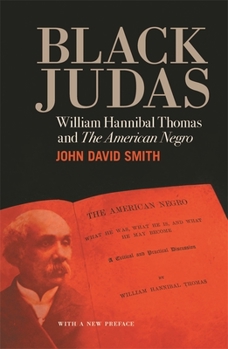Black Judas: William Hannibal Thomas and the American Negro
Select Format
Select Condition 
Book Overview
William Hannibal Thomas (1843-1935) served with distinction in the U.S. Colored Troops in the Civil War (in which he lost an arm) and was a preacher, teacher, lawyer, state legislator, and journalist following Appomattox. In many publications up through the 1890s, Thomas espoused a critical though optimistic black nationalist ideology. After his mid-twenties, however, Thomas began exhibiting a self-destructive personality, one that kept him in constant trouble with authorities and always on the run. His book The American Negro (1901) was his final self-destructive act.
Attacking African Americans in gross and insulting language in this utterly pessimistic book, Thomas blamed them for the contemporary "Negro problem" and argued that the race required radical redemption based on improved "character," not changed "color." Vague in his recommendations, Thomas implied that blacks should model themselves after certain mulattoes, most notably William Hannibal Thomas. Black Judas is a biography of Thomas, a publishing history of The American Negro, and an analysis of that book's significance to American racial thought. The book is based on fifteen years of research, including research in postamputation trauma and psychoanalytic theory on selfhatred, to assess Thomas's metamorphosis from a constructive race critic to a black Negrophobe. John David Smith argues that his radical shift resulted from key emotional and physical traumas that mirrored Thomas's life history of exposure to white racism and intense physical pain.Format:Paperback
Language:English
ISBN:0820356263
ISBN13:9780820356266
Release Date:November 2019
Publisher:University of Georgia Press
Length:436 Pages
Weight:1.16 lbs.
Dimensions:1.1" x 6.0" x 9.0"
Related Subjects
African-American & Black African-American Studies Arts & Literature Authors Biographical Biographies Biographies & History Biography & History Civil War Ethnic & National History Military Modern (16th-21st Centuries) Politics & Social Sciences Social Sciences Specific Demographics United States Civil WarCustomer Reviews
2 ratings
black critic savages own race
Published by Thriftbooks.com User , 24 years ago
In words that only a white bigot could appreciate, william hannibal thomas uses all manor of invective to decry the condition of his own black race. In his book 'the american negro', published in l901 by macmillan, thomas decries the condition of what he still called freedmen, 36 years after emancipation. Ironically, in the decades before publication of the book, thomas had been a most intelligent observer of conditions for blacks in the post-bellum south. he pointed out the degradation that had occurred as a result of the violence and intimidation by whites, angry at the privileges they lost from the civil war. attempts at race redemption were thwarted at every turn and there was no better example than the life of thomas himself. Thomas had some education as he grew up in ohio, partially as a result of brief schooling in his teen years and the rest from the efforts of his mother. he fought courageously alongside both free blacks and newly-freed slaves in the civil war, losing an arm in the final months of combat. The turning point in thomas's life as well as those of his darker skinned brethren was the election of l876 in which the election of rutherford b. hayes was traded for the end of reconstruction, removal of federal troops from the south, and the betrayal of the negro by resumption of white rule for the benefits of whites south of the mason-dixon line. in the process, thomas lost a seat in the south carolina legislature he gained by public vote and soon had to leave the state because improprieties and scandal of his own making made him a fugitive from the courts. the author of this biography, john david smith, pulls no punches in describing the wayward and sometimes corrupt behavior of thomas, but also presents evidence to redeem the character of the man who was to become a target of black leaders across the country. in many publications and speeches as a minister, thomas decried the conditions of former slaves in the south. neoslavery is the term used by thomas to describe the loss of the promise of the war and war amendments in the decades that followed. education, training and land were what was needed, but thomas also felt that moral transformation from the degradation and dependence fostered by slavery was of the utmost need. yet thomas deserted his wife and children, leaving them on public assistance in philadelphia, and eventually found a new wife and settled in in a suburb of boston. it was there that all the frustrations and failures to achieve national fame as a leader of his race came to a head. the constant pain from his wound also is said to play a major part in the transformation from an observer and critic of race relations to an unrepentent cynic and enemy of his own race. web dubois makes the obvious point that what is important in thomas's book is not the content, but what caused a black man to foresake his own race, perhaps to gain favor from thos
An outstanding contribution to Black biographical history.
Published by Thriftbooks.com User , 24 years ago
Black Judas provides the first biography of William Hannibal Thomas, who betrayed his race by writing The American Negro, an insulting attack on Afro-Americans. Black Judas examines the roots of Thomas' thinking and his transformation from an optimistic black nationalist to a man who attacked his race. The detail and in-depth coverage is invaluable.






